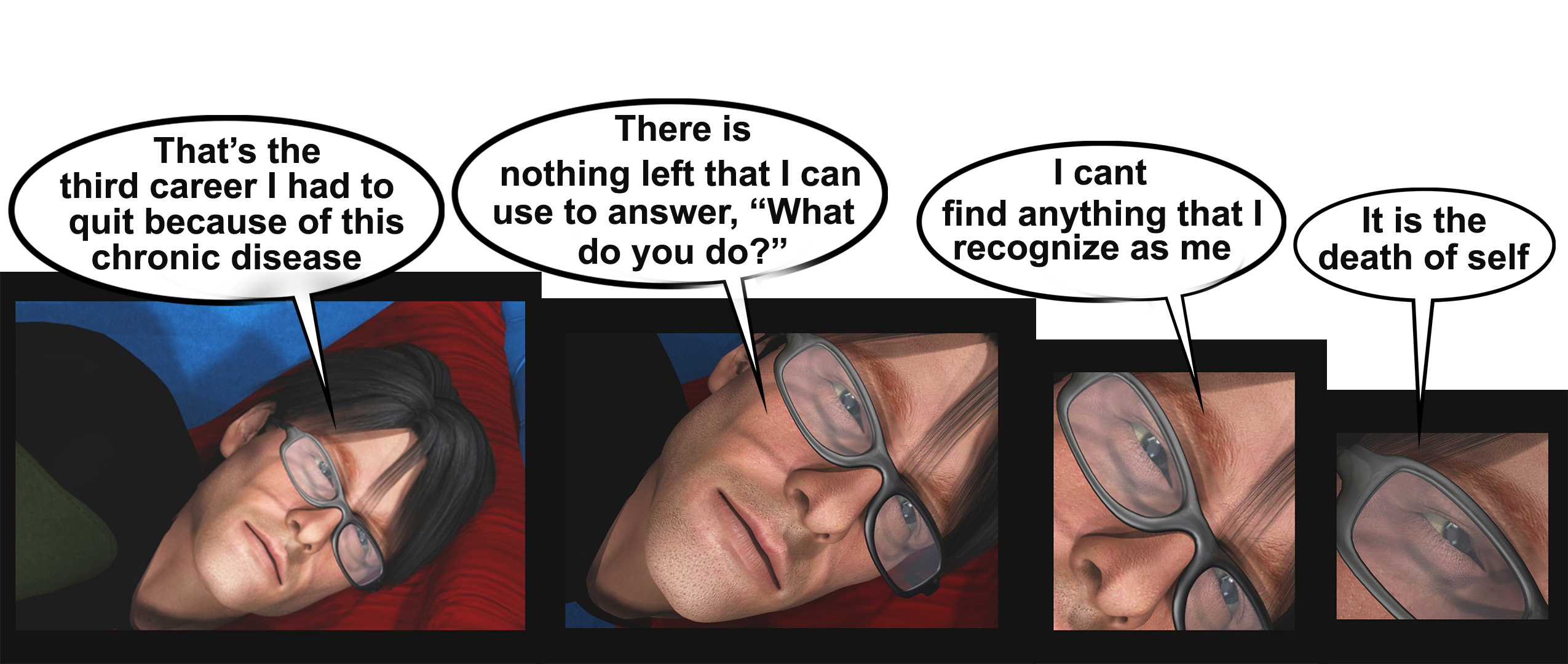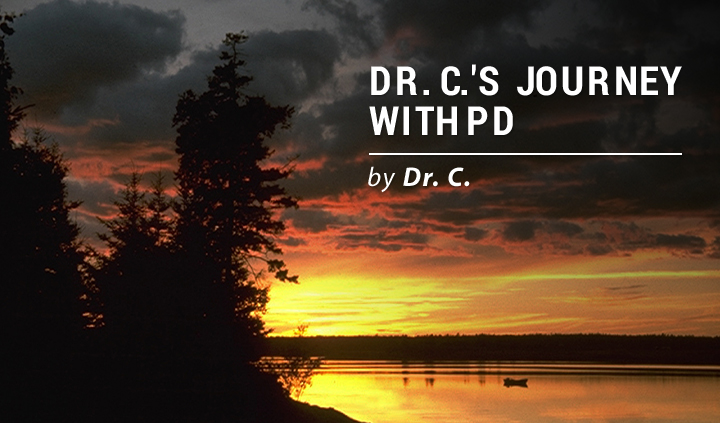The Death of Self: A Casualty of Chronic Disease
Written by |

(Graphic by Dr. C)
Death, the “D” in the CHRONDI Creed, refers more to the death of our self-identity than it does to physical death. As we endure the long battle with a chronic disease and deal with a gradual progression in symptoms, a loss of function occurs. I touch upon the stealing away of bits and pieces of both physical and mental function in my column about the “disease thief.”
The disease thief robs us of so many of the ways by which we know ourselves. It is a death of the self that is a casualty of chronic disease. The death of self needs to be addressed with as much mindfulness as any other part of the creed for total health to be maintained at the highest level possible.
There is no manual for navigating through the death of self. I was educated in many ways to be prepared for it. And yet when it happened, I was shocked by the severity of its effects. Parkinson’s disease gradually took from me those things I identified as belonging to myself, things I would pull out of my pocket when someone asked, “What do you do?”
Following is a list of things that were stolen from me, roughly in chronological order:
- Field mineral specimen collecting (since I was a teenager)
- Professional field geologist
- Hiking and exploring rugged terrain
- Clinical counseling work
- Professor of counseling and geology
The time and money spent on four college degrees are behind all the years of experience expressed in the above list. Now all are casualties of a chronic disease. It is the death of self.
Join the Parkinson’s forums: an online community for people with Parkinson’s Disease and their caregivers.
Looking in the mirror, past the gray hair and crevasses of age, deep into multicolored eyes, I found nothing that I remembered as me. The self I once knew was gone — dead! I was sitting in a void in a life without meaning, with nothing of familiarity.
From my clinical work, I knew that people get lost when this happens. It can be quite difficult to find the way back. I also knew something about this journey from mystical teachings, but knowing and living through it personally are two different things. Somehow, I had to find my way out. I had to heal from the death of self.
We can apply stages of grief to healing from the death of self. As I mentioned in the disease thief column, we should use terror management should as needed. And it is important to have a support network through the process, including peers, family, and technology. Additionally, the CHRONDI Creed can be used to help with healing, particularly the “I” in Identity. I will cover that in the next column.
Have you experienced the “death of self” while battling a chronic disease? What progress have you made?
***
Note: Parkinson’s News Today is strictly a news and information website about the disease. It does not provide medical advice, diagnosis or treatment. This content is not intended to be a substitute for professional medical advice, diagnosis, or treatment. Always seek the advice of your physician or another qualified health provider with any questions you may have regarding a medical condition. Never disregard professional medical advice or delay in seeking it because of something you have read on this website. The opinions expressed in this column are not those of Parkinson’s News Today or its parent company, Bionews Services, and are intended to spark discussion about issues pertaining to Parkinson’s disease.







Dan O' Brien
I'm a professional guitarist and vocalist, having spent the last 50 years playing music. In just the last few months I've noticed that I just don't feel like the old me... Things that once excited me don't seem quite as bright as before. The physical challenges of Parkinson's is beginning to make it difficult to continue, and that only serves to fuel the sense of losing my self to this invader...
Dr. C
You hit it out of the park! As PD takes away things that were a significant part of life then one ends up looking in the mirror and saying, "I just don't fee like the old me". But now that you know that this "Death of Self" is part of what you are going through you can start to be proactive. Put the CHRONDI Creed into action, in particular the last letter - the I. If it starts to get to dark, get some professional help, but always remember that there are ways to create a new healthy identity. Courage, persistence, keep looking for that new identity hat to wear.
Glenn Jacobsen
My 96 year old mother reminds me of something I used to teach my students ... anything alive changes. Dead things, too, actually, it is called degradation but healthy live things adapt. Something else that my mother helped me understand ... the beauties of curiosity. Yes, PD, and in my case related generalized Dystonia, changes but figuring out how to adapt to those changes, how to manage them, how to actually improve them rather than be defeated by them, presents challenges. Major challenges involving not only all parts of our bodies but also our emotions, our brains, of course, and to our familial, social, community interactions. Finally, as my mother has often said ... "growing old is not for cowards."
Michael J Church
Well stated sir! You've captured the essence of life with PD and demonstrated that can be possible but not guaranteed successful to achieve a harmonious relationship at certain times. Bravo!
Dr. C
Very kind comment. I like the "harmonious relationships at certain times" because that matches my experiences. I do work hard at the CHRONDI Creed and it does help to promote harmonious relationships - most of the time. But I am as frail as the next guy struggling with a chronic disease. I can get overwhelmed when I try to "push through" deep fatigue combined with pain, a bad day, and poor motor movement, in order to reach some goal. I can get pretty snarky. I try to keep those moments down to around four times a year. When I was healthy it was only once every four years. So, yeah harmonious "most of the time".
peter ruggill
I think you have overemphasized the loss of one aspect. You indicate a broad range of interest and abilities, so one tree that fell in the forest is not the whole. Nurture and be nurtured by the others still standing.
Gunvant Patel
As a psychiatrist who was diagnosed in 2014 and saw my 'professional self' gradually wither and finally 'die' in August last year, I can certainly relate to your post. The sense of loss for me has been as much about feeling no longer relevant and a burden which is I think particularly hard for those of us used to investing our self in feeling valued by others in similar states of need. Compounding this is the sense of feeling judged as having given up too readily as from the outside I look like I'm very fit (going to the gym 4-5 x/wk being the reason). So there's guilt to add to the burden as well as loss of one's social cum professional network. At this stage the challenge is finding a way to rehabilitate and develop a new self and to what extent that means having a PD focused one. Notwithstanding the increasing effort to just deal with the PD as time marches on. Having a supportive family network is important but then again they are also having to negotiate their relationship with this other you (who is now at home and not off working). Perhaps having some sort of online presence may help and certainly columns like yours and other PD support networks are starting to become a necessary connection to combat what can otherwise feel a very isolating existence (not entirely I hasten to add). I have found that others are more comfortable when you present as heroic but not so much when you come across as a vulnerable being. Made worse no doubt by the latter heightening one's inter-personal sensitivity and fear of rejection leading to ruminative self-doubts. So not easy but thanks and apologies for the lengthy reply.
Dr. C
Beautiful, well thought out, and spot on! I agree that being vulnerable is tough, but I think when dealing with the loss of self (our self before PD) sharing what is going on is really important. Being fit and looking like there is not much wrong is something I have faced and continue to face. If they could only see me on those real ugly days during my off period - it is not pretty! Then there is that voice, "you could have worked longer", or as you stated "feeling judged as giving up too soon". For me, some of that is not just the voices of others but my own echoing support. Otherwise it wouldn't push my buttons. Deep down inside I knew I could no longer provide the top quality service for which I was known. I also knew that I was at greater risk for creating harm. I had to stop. It wasn't too early. Once I convinced myself of this truth the issues, and nagging voices, faded away. The highpoint of your reply is the statement, "At this stage the challenge is finding a way to rehabilitate and develop a new self and to what extent that means having a PD focused one." This is what the CHRONDI Creed is all about. It is a challenge. Keep writing replies to my columns and let's see if in sharing this battle with a chronic disease we can lighten each other's load.
Christine Franklin
I'm not sure my story of healing applies, I don't have PD and my heart goes out to you all that are dealing with this awful disese.